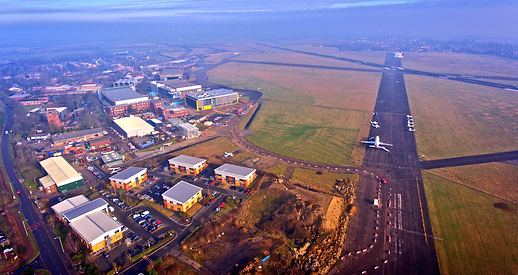Financial & Commercial Advisory Services
Cranfield University’s Sustainable Energy Transformation
September 2023
Cranfield University has devised an Environmental Strategy that includes a goal of achieving Net Zero Carbon emissions by 2030. Additionally, the university has been closely monitoring developments in the UK’s “Energy Transition” and the growing emphasis on Smart Local Energy Systems (SLES) in government policy.
Project details
Client:
Cranfield University
Sector:
Energy Transition
Subsector:
SLES
Service:
Commercial Advisory, SLES assessment

Photo credit: Fusion2018, Wikimedia Commons
We are delighted to announce that Amberside Advisors were chosen by Cranfield University to help support the delivery of their SLES strategy. The project aims to accelerate the University’s energy decarbonisation plan, realise monetisation of University energy infrastructure and provide an innovative platform for academic development across a range of sustainability and climate change fields.
The project’s scope encompasses several key components:
• Conducting a high-level assessment of sustainable energy needs for the Cranfield campus.
• Developing an assessment of a potential coordinated smart local energy system proposition.
• Conducting a high-level evaluation of the potential benefits of a coordinated SLES approach for Cranfield.
• Performing a commercial review, including projections for financial investment requirements and potential market entry strategies.
• Compiling a comprehensive management report with recommendations for the next steps and overall conclusions.
Challenges of the project
The main challenges faced during the project evolved around the unique nature of the client’s requirements, which meant that the project’s critical success factors were slightly different. But more importantly, we faced the issue of Cranfield University’s limited access to funding, which prompted the need to leverage private finance – something Amberside was perfectly placed to advise on.
Jack Bedells, Amberside’s Commercial Advisor and Project Manager for this assignment, explained: ‘To mitigate these risk factors, we held and in depth kick off meeting with the key stakeholders on the client’s side to get a thorough understanding of their main priorities and how best we could achieve them. We also made sure that the client was aware of all public and private funding solutions that were available to them and explained the advantages and disadvantages of each in detail.‘
Amberside added value
Amberside’s contribution to the project was substantial. By working closely with Prof. David Healey from Keele University, the Amberside team will prioritise the use of digital technology to efficiently integrate distributed sustainable energy solutions. Collaboration with a subcontractor possessing extensive knowledge of solutions suitable for universities ensures a highly tailored approach to meeting the client’s needs.
Smart local-based energy systems have the potential to generate financial value for consumers, energy networks, investors, policymakers, local stakeholders, society at large, and the energy system itself. Amberside possesses a deep understanding of how SLES’s can effectively contribute to mitigating climate change, creating significant socio-economic benefits at the local level, and substantially reducing consumer energy costs.




